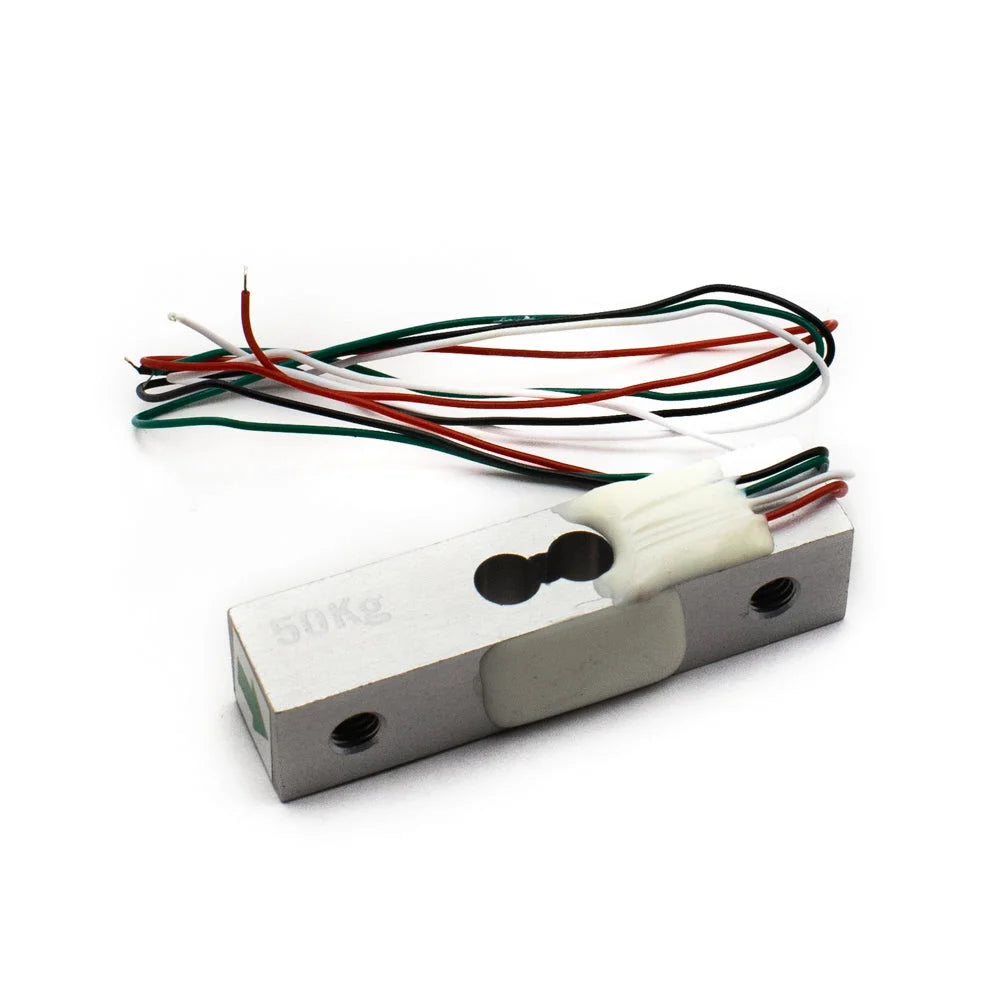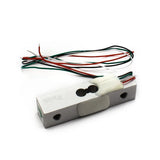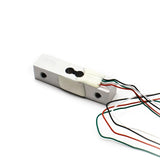A load cell is a force sensing module that consists of a well-built metal structure with small strain gauges installed in exact positions. Load cells are made to measure a single force and ignore any other forces that may be present. The load cell's electrical signal is relatively tiny and requires specialized amplification.
Fortunately, the 1046 Phidget Bridge will handle all of the electrical output amplification and measurement. Load cells are designed to measure force in one direction. They will often measure force in other directions, but the sensor sensitivity will be different, since parts of the load cell operating under compression are now in tension, and vice versa
Working
Load cells with strain gauges translate the force imposed on them into electrical impulses. Strain gauges, which are essentially small, flexible circuit boards, are used to measure the resistance patterns. The strain gauges are bonded to a beam or structural part that deforms when weight is applied, causing the gauge to deform as well. The electrical resistance of the strain gauge changes in proportion to the load as it is deformed.
The changes to the circuit caused by force are much smaller than the changes caused by variation in temperature. Higher quality load cells cancel out the effects of temperature using two techniques. By matching the expansion rate of the strain gauge to the expansion rate of the metal it€š¬€ž¢s mounted on, the undue strain on the gauges can be avoided as the load cell warms up and cools down. The most important method of temperature compensation involves using multiple strain gauges, which all respond to the change in temperature with the same change in resistance. Some load cell designs use gauges that are never subjected to any force but only serve to counterbalance the temperature effects on the gauges that measure force. Most designs use 4 strain gauges, some in compression, some under tension, which maximizes the sensitivity of the load cell, and automatically cancels the effect of temperature.
Installation
Small jewellery scales and kitchen scales uses this Single Point Load Cell. It's mounted by fastening down the wire-attached end of the load cell and exerting force in the direction of the arrow on the other end. Because this load cell measures a shearing effect on the beam rather than bending, it doesn't matter where the force is delivered. When a small platform is mounted on the load cell, as in a small scale, the load cell produces precise measurements independent of the load's position on the platform.
Calibration
A simple formula is usually used to convert the measured mv/V output from the load cell to the measured force:
Measured Force = A * Measured mV/V + B (offset)
It€š¬€ž¢s important to decide what unit your measured force in - grams, kilograms, pounds, etc.
This load cell has a rated output of 1.0±0.15mv/v which corresponds to the sensor€š¬€ž¢s capacity of 50kg.
Since the Offset is quite variable between individual load cells, it€š¬€ž¢s necessary to calculate the offset for each sensor. Measure the output of the load cell with no force on it and note the mv/V output measured by the PhidgetBridge.
Offset = 0 - 50 * Measured Output
Specification
| Housing Material | Aluminium Alloy |
| Load Cell Type | Strain Gauge |
| Capacity | 50kg |
| Size | 55.2x12.7x12.7mm |
| Mounting Hole | M5 Screw Size |
| Cable Length | 200mm |
| Wire Gauge | 30 AWG |
| Number of Wires | 4 |
| Precision | 0.05% |
| Rated Output | 1.0±0.15mV/V |
| Non-Linearity | 0.05% FS |
| Hysteresis | 0.05% FS |
| Non-Repeatability | 0.05% FS |
| Creep (per 30 min) | 0.1% FS |
| Temperature effect | 0.05% |
| Zero Balance | ±1.5% FS |
| Input Impedance | 1130±10Ω |
| Output Impedance | 1000±10Ω |
| Insulation Resistance | ‚¬°¥5000MΩ |
| Excitation Voltage | 5V DC |
| Safe Overload | 120% of Capacity |
FAQs
About Shipping Charges and delivery time
- Standard shipping: Rs 80 /- The order gets delivered within 4-6 working days. (6-7 days in case of the battery as it travels through the surface).
- Free shipping is applicable to the purchase of Rs.999 and above. The order gets delivered within 4-6 working days. (8-10 days in case of the battery as it travels through the surface)
How do I pay for my order?
You can choose from multiple payment options on the checkout page of Electronify India, ensuring a seamless and convenient shopping experience. Payment methods include Credit/Debit Cards, Internet Banking, Mobile Payments, Manual Bank Transfers, and now PhonePe Payment Gateway. Additionally, you can apply discount coupons received from Electronify India or redeem reward points earned from your previous purchases to save even more.
I want to know where is my order?
Once the parcel is ready, packed, and shipped, the customer receives an email or/and SMS about the tracking details. We recommend you use those details to track your order.
Note: For any incorrect delivery status issue, we request the customer to please first check with your neighbors, security guard, and watchman and still you face delivery issue then please call and raise the ticket at info@electronifyindia.com within 48hrs after the incorrect delivery status of the order.
I Need A Quotation for some products
Please submit a ticket with all the details of your requirement and we will be providing you with the quote for the same right away. If the SKUs of the products from electronifyindia.com are mentioned then it would be a lot easier to process your requirement. Please make sure to cover below point
- Name which should appear on quotation with address.
- Required complete product details and quantity.




